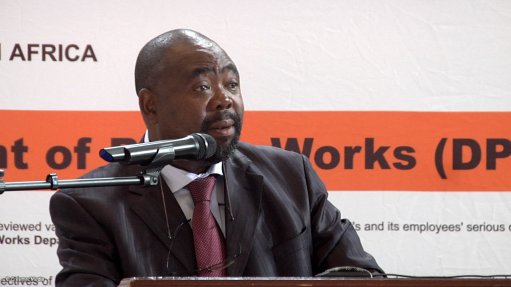
Public Works Minister Thulas Nxesi
The Department of Public Works (DPW) was aiming to have the Property Management Trading Entity (PMTE) established as a government component and “up and running” by November this year, Public Works Minister Thulas Nxesi said on Tuesday, adding that the DPW planned to have appointed key top-level management executives by that time.
Addressing the media, the Minister said that once these executives had been appointed – with the positions to be advertised within the next week – they would deal with the structure of the PMTE and revise the business case for the entity.
“So we are not going to delay in this particular area, we want to move, we are steaming ahead,” he asserted.
He explained that Cabinet’s approval, last week, of the business case for the establishment of the PMTE represented the culmination of two years of work by the DPW, which made up the stabilisation phase of the department’s turnaround plan.
“The PMTE account constitutes 75% of the work and budget of the DPW. It is the largest property portfolio in South Africa, but it has been mismanaged, lacking the requisite skills in asset management, property development, real estate and facilities management.”
Nxesi noted that, during the DPW’s stabilisation phase, the department had had to deal with systemic weaknesses in its core property business, which had manifested in recurrent negative audit findings, major problems with private leases, substandard government facilities, a lack of planned maintenance, inadequate control and security, the underutilisation of State property and major costs to the State.
During the stabilisation phase, the department had determined that there were 112 000 State properties, with about 30 000 of these buildings currently not in use.
“[Further], instead of using our own accommodation, the trend has been towards leasing-in for government accommodation, [with] 2 700 properties currently leased at a cost of R3.2-billion to the fiscus,” he noted.
Nxesi pointed out that the DPW had conducted an audit of these private leases, which had resulted in the strengthening of lease management systems, the renegotiation of leases downward to achieve savings of R30-million a year and a 5.5% ceiling being placed on the escalation of leases by National Treasury.
The Minister added that the audit had also highlighted leases where fraud and corruption were suspected, with further investigations under way.
In addition, the DPW had also identified properties that may have been illegally transferred from the State.
“These will be forensically investigated and action taken as part of our ‘Bring Back Campaign’,” Nxesi stressed.
He noted that these improvements had already led to improved audit findings over the past two years, stating that the DPW went from a disclaimer to unqualified opinion, while the PMTE went from disclaimer to qualified opinion.
PMTE BUSINESS CASE
Nxesi emphasised that the PMTE would be established as a government component under the DPW, and not a State entity and would, therefore, not have a board.
In responding to questions from the media, he explained that South Africa had too many State entities and that government could not continue creating these structures, especially when there was no true need for them.
He further noted that a new entity could not be added while a review of State entities was under way.
Therefore, the DPW was creating a government component, such as the Government Printing Works and the South African Revenue Service, he stated.
DPW director-general Mziwonke Dlabantu, who also addressed the media, explained that, through the PMTE, government was reclaiming its role in terms of property management.
He said that, at the moment, the forces were not balanced, as government was unable to engage on the same level as the private sector; however, the PMTE would address this through the appointment of professionals to ensure that the DPW could engage as needed.
Nxesi stated that the business model of the PMTE called for the appointment of experienced property professionals at a strategic level.
He noted that the budget to appoint these professionals was not included in the normal DPW salary structure and that the department was currently in negotiations with National Treasury on accessing additional funding.
Further, in terms of the PMTE business model, the DPW would retrain its existing staff in property management and support the youth through professional skills development and apprenticeships.
Also, as the DPW would not have the budget to employ an “army of property managers”, the department was working with the Department of Trade and Industry and the Small Enterprise Development Agency to establish cooperatives and to support small businesses in undertaking this work.
This tied into the PMTE’s empowerment and job creation objectives.
Nxesi said these small businesses would be supported through DPW workshops, which were in the process of being revived in the country’s main centres.
Meanwhile, in relation to the real estate component of the PMTE business, the DPW intended to work with emerging black estate agents to market the investment stock and manage the leasing-out of properties.
“The big picture is to ring-fence, better manage and optimally use this massive State property portfolio to build value and to bring savings to the State, as well as other socioeconomic benefits, particularly job creation and empowerment, while improving service to client departments,” Nxesi concluded.